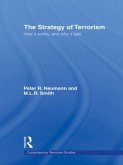This handbook offers a collection of cutting-edge essays on all aspects of strategic culture by a mix of international scholars, consultants, military officers, and policymakers.
The volume explicitly addresses the analytical conundrums faced by scholars who wish to employ or generate strategic cultural insights, with substantive commentary on defining and scoping strategic culture, analytic frameworks and approaches, levels of analysis, sources of strategic culture, and modalities of change in strategic culture. The chapters engage strategic culture at the civilizational, regional, supra-national, national, non-state actor, and organizational levels. The volume is divided into five thematic parts, which will appeal to both students who are new to the subject and scholars who wish to incorporate strategic culture into their toolbox of analytical techniques. Part I assesses the evolving theoretical strengths and weaknesses of the field. Part II lays out elements of the theoretical and methodological foundations of the field, including sources and components of strategic culture. Part III presents a number of national strategic cultural profiles, representing the state of contemporary strategic culture scholarship. Part IV addresses the utility of strategic culture for practitioners and scholars. Part V summarizes the key theoretical and practical insights offered by the volume's contributors.
This handbook will be of much interest to students of strategic studies, defense studies, security studies, and international relations in general, as well as to professional practitioners.
The volume explicitly addresses the analytical conundrums faced by scholars who wish to employ or generate strategic cultural insights, with substantive commentary on defining and scoping strategic culture, analytic frameworks and approaches, levels of analysis, sources of strategic culture, and modalities of change in strategic culture. The chapters engage strategic culture at the civilizational, regional, supra-national, national, non-state actor, and organizational levels. The volume is divided into five thematic parts, which will appeal to both students who are new to the subject and scholars who wish to incorporate strategic culture into their toolbox of analytical techniques. Part I assesses the evolving theoretical strengths and weaknesses of the field. Part II lays out elements of the theoretical and methodological foundations of the field, including sources and components of strategic culture. Part III presents a number of national strategic cultural profiles, representing the state of contemporary strategic culture scholarship. Part IV addresses the utility of strategic culture for practitioners and scholars. Part V summarizes the key theoretical and practical insights offered by the volume's contributors.
This handbook will be of much interest to students of strategic studies, defense studies, security studies, and international relations in general, as well as to professional practitioners.









